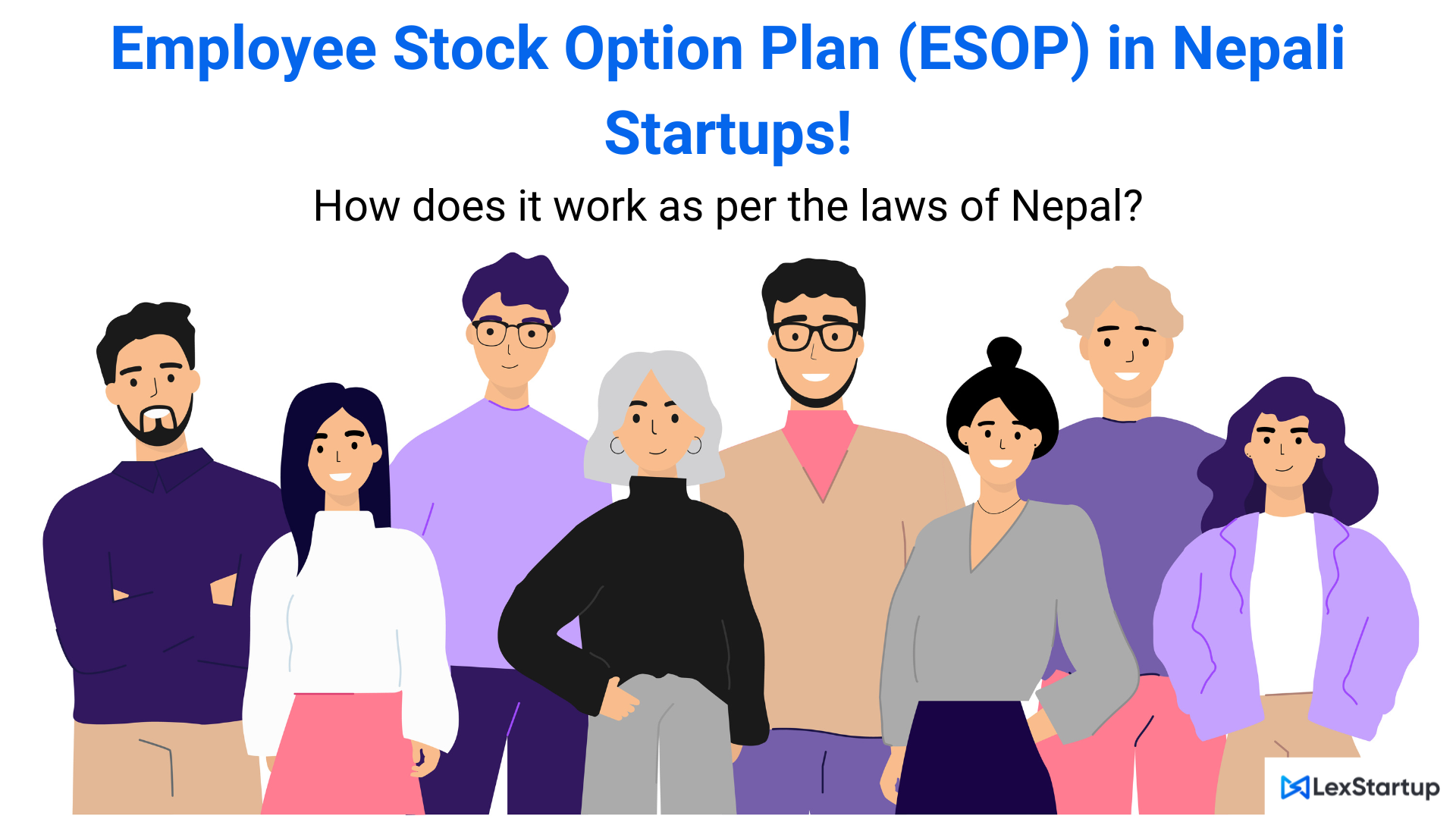Background
Employee Stock Option (ESOP) refers to an option given to the employees of a company to buy shares of the employer company. It is an equity-compensated remuneration package granted by the companies to their employees and executives whereby the employees and executives can opt for stock ownership of the company in consideration to the service provided by them to the company.
ESOP puts forward an opportunity to exercise the right to purchase the company’s stock at an agreed price for a finite period of time. When an employer offers an employee stock option, they do so through a special contract called Stock Option Agreement. Such agreement includes the terms of offer, vesting schedule, time limits for exercise once vested and any other special conditions.
In Nepal, the practice of selling shares of the company to the employees is done under a scheme of selling shares to its employees, whereas the terminology ESOP itself is not seen to be used. Company Directives, 2072 (hereinafter referred to as the “Directives”) in section 31 provides that a company may issue its shares as reward to any person for service rendered to the company from such person. Shares issued for all such services including advisory services, shall be attested by the written contract concluded between the company and the service provider, to that effect. Such service contract shall explicitly incorporate the issues relating to the reward amount of the service rendered and the number of shares issued pursuant to such reward. In addition, such a contract is required to precisely disclose to what extent such shares are to be considered paid-up.
Similarly, Company Act, 2063 (hereinafter referred to as the “Act”) entails few provisions regarding issuance of shares by an employer company to its employees. Section 64(2) of the Act provides that a company can issue shares to an employee, pursuant to employee share scheme, at discount by adopting a special resolution at general meeting to that effect.
Section 9(3) of the Act provides that any employee who has purchased shares of a company under the scheme of selling shares to employees is not counted as a shareholder. Furthermore, section 61(4) of the Act reads that where a special resolution is adopted by the general meeting, the concerned company may buy back its share from the concerned employees of the company to whom shares have been allotted within a period of 12 months of the adoption of that resolution. Section 62(2) of the Act encompasses provision relating to loans that can be provided by the employer company to its employee(s) for the employee(s) to purchase the fully paid up shares of that company or its holding company or acquire ownership over such shares under a scheme of selling shares to its employees.
As we try to measure the advantages and the disadvantages of opting ESOP by Nepalese companies, the pros and cons are enlisted as:
Pros:
1. It provides an opportunity for the employees of a company to own the employer company’s stock at a deducted rate.
2. It motivates employees to contribute towards better corporate performance, as s/he now considers the business as her/his own.
3. It is a perfect means for the employer company to retain its employees.
4. It creates an in-house market for the employees willing to make business investment.
5. ESOP is practiced worldwide for its attribution in deduction of payable taxes.
Cons:
1. ESOP is a complex and expensive plan to be administered, also taking into account the legal liabilities associated thereunder.
2. For Nepalese share market, the concept is comparatively newer and also the law is quite unclear regarding the application, which in turn is likely to attract disarray during application.
How does ESOP actually work?
Since Nepali legislation has very little to say on ESOP, it might imply that the companies have discretion while creating such resolutions in respect to the matters not governed by law. However, for the listed public companies, as per section 27 of the Securities Act, 2007, prior to the issuance of shares under ESOP, the companies are required to register such shares in the Securities Board of Nepal (SEBON). As legislated by section 28 of the Securities Act Upon the allotment of shares after the registration, companies are bound to give notice to SEBON within 7 days of allotment.
The process of undergoing ESOP by a Nepalese company can be delineated as:
Step 1: Adoption of Special Resolution
Section 18 of the Act requires that the companies shall mention the types of shares of the company, the rights and powers inherent in such shares, values of each share and number of different types of shares in its Memorandum of Association (MOA). Thus, the company is required to mention the shares issued to its employees in its MOA. If not, the company shall at least mention that no other shares besides normal shares have not been issued and if any such special shares are to be issued in future, the decision regarding the same will be taken by general assembly and will be authorized by the Office of Company Registrar.
Hence, if there is no provision regarding ESOP in a company’s MOA, it can be deduced that the company shall adopt a special resolution regarding ESOP through general meeting before granting options to employees to purchase shares. The resolution shall contain following matters:
- Definition of specific terms such as, Employee Stock Option, Employee Stock Option Scheme, vesting, vesting period, exercise, exercise price, grant, share and other necessary terms,
- Total number of options to be granted,
- Identification of classes of employees to participate in Employee Stock Option Scheme (ESOS)
- Requirement of vesting and vesting period,
- Exercise price or pricing formula,
- Process of determining the eligibility of employee,
- Maximum number of options to be issued per employees and in aggregate,
- The method which the company shall use to value its option whether fair value or intrinsic value,
- Exercise period,
- Rights of the employees after exercising the option,
- Transferability of the option,
- Accounting policy that the company shall conform to.
Note: The company shall provide equal status or rights to every employee who exercises the options granted.
Step 2: Grant of Option
The company puts forward an option to the eligible employees to purchase its ‘x’ number of shares after ‘x’ period of time at ‘x’ price. Such an option is put forward through a letter of grant and the letter shows commitment of the company. The number of shares offered to each employee could be different as decided by the company. The period of time after which the employees are offered to buy shares is usually known as vesting period. The price is predetermined on the date of offering the grant of option. Thus, if the employee opts to buy shares as offered, s/he will have to pay such a predetermined price even though the market value of the share is higher at the time of purchase. Such price is known as exercise price or grant or strike price.
Step 3: Vesting of Option or Option to Buy
In this step, the right to exercise the option is vested in the employees after the vesting period has expired which is called vesting. The date on which such a right is actually vested is known as vesting date. Now the employees can actually purchase the shares as committed by the company in a letter of grant. Since ESOP is only an option but not compulsion, the employees can opt to purchase the shares or not to purchase. It is profitable for an employee to purchase the shares only if the market value of the shares at the time is higher than the exercise price.
Can an employee purchase the share whenever they wish after the vesting date?
The employees should decide whether to purchase or not within the exercise period otherwise the option will lapse or become ineffective. Exercise period means the period of time within which the employee needs to exercise the option, the exercise period begins after the vesting date.
Step 4: Allotment of Shares
If the employee has decided to purchase the shares within the exercise period, the company needs to allot shares as committed and the employee needs to pay the exercise price. The company could allot all the number of shares as mentioned in the letter of grant all at once or allot them at different periods of times at different percentages. For example, 25% after the completion of one year, 30 % at the completion of the next one year and so on.
Regarding the taxability, as per Indian practice, when an employee exercises the option of buying the shares, the difference between the market value of the share and the exercise value of the share will be taxable, as it is a prerequisite obtained by the employee.
Upon the sale of shares by the employees, if the employee sells the shares at a higher price than the exercise price, it is considered capital gains and is taxed accordingly.
ESOPs from an employee’s perspective:
An ESOP, in essence, is an employee-benefit plan offering employees with the stock ownership of the employer company and that too, at a nominal rate. It is a tremendous motivator and can encourage employees to engage in betterment of corporate performance. It is a wonderful opportunity for the service-providers to have direct shares in the company's shares. ESOP is also to be considered a significant retirement benefit plan for the employees since the stock ownership remains intact even after the employee stops working for the employer company.
On the other hand, the fact this is way better and wide than the cash-benefit option makes employees opt out for ESOP. In a cash-benefit plan, the contribution is in cash which is further invested in other investments which have either little or no meaning to most of the employees. Also, most employees have minuscule or zero information as to how these investments do in the marketplace. Investment in ESOP is exactly the opposite. Employee shareholders know about how her/his company is doing in the marketplace. In addition, owning stock of the employer company entails with it a new sense of dignity, new status and new awareness of the pride of ownership in employee’s share. Predominantly, it creates a direct and evident link between employee productivity and employee benefits.
However, Pursuant to section 9 of the Companies’ Act, 2063, employees who subscribe to the shares upon ESOP are not counted as the shareholders of the company thus implying that employees are provided with special shares, not general ones. In practice, the voting rights pursuant to the shares subscribed is limited and falls upon the discretion of the company. Similarly, they are only vested with the economic rights pursuant to the shares subscribed, but not with the board representation. Nonetheless, considering the fact that the employees know about the nuts and bolts of the employer company, it seems totally fair for the company to not engage them in control of the company.
ESOP at the time of Economic Distress
The companies, especially the start-ups, might face the problem of cash liquidity at the time of economic distress and have difficulty in paying their employees. Thus, the companies may offer the option to the employees to purchase shares of the company as a compensation package.









